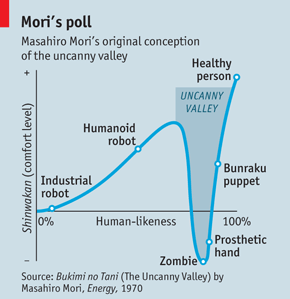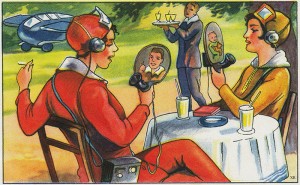Why does Black Mirror works?
The British TV series by Charlie Brooker explores the side effects of the 21st century’s drug: our black mirrors (TV, computer, monitor, smartphones, etc). Each episode brings the viewer to a future not too far from his current life, taking a thread of technology and pushing it to its limits. It is always spot on, not too satirical for us to believe in it and dark enough to make us feel uncomfortable. Maybe the reason why Black Mirror moves us so much is because it flirts with the uncanny valley. The principle of the uncanny valley is that any human representation getting to close to a real human would bring discomfort. It is the same with the series. This representation of our reality is getting so close to what we perceive might happen in the very near future that we feel discomfort. This feeling is put to good use as it makes us think about our current society. For instance some try not to look constantly at their smartphone like drug addicts, to the extent that a word was created: JOMO, joy of missing out, the opposite of FOMO, fear of missing out.
Technology within society
Techno-paranoia is an ever coming back motto that divides the world between tech-lovers and tech-skeptics. A third category should arise, the tech-questioners, citizens who are not satisfied with the status quo of the lazy “so what?” and who wonder what would be the potential consequences. This is why I feel Black Mirror is such a clever show, because it makes us think.
Even though we clearly see the benefit of the progress in technology (not only in terms of communication but also for social and ecological purposes), we cannot shake the feeling that this time the reality is catching up with the fiction. Alright, cars cannot fly yet. But biometry, data collection, wearables, the Internet of things get us very close to SciFi movies (Blade Runner, Metropolis to only name a few). Similarly a century ago or so people were also trying to understand how the future would look like. For instance a German artist in the 30s invented Skype or Facetime:
Superheros and dystopian movies told us to ask ourselves a simple question: what if these technologies were put to bad use or at least to extreme use? And this reminds me of the last Disney, Big Hero 6, where the hero invents a brilliant technology, the microbots…. but in the hands of a hurt father it becomes a weapon. And as a friend of mine pointed out, that is not discussed by any of the protagonists in the movie. Only the villain is punished and there is no shared responsibility. What happen to “with great power comes great responsibility” (quote from Uncle Ben in Spiderman)? Maybe this is an outdated slogan, only good for the Cold War era when the risk of blowing up the planet with a nuclear bomb seemed to be a possible outcome. Should it be “watch out for black mirrors”?
A very insightful link for the French reader: here.
Black Mirror: the explanation of each episode and unofficial trailer.

